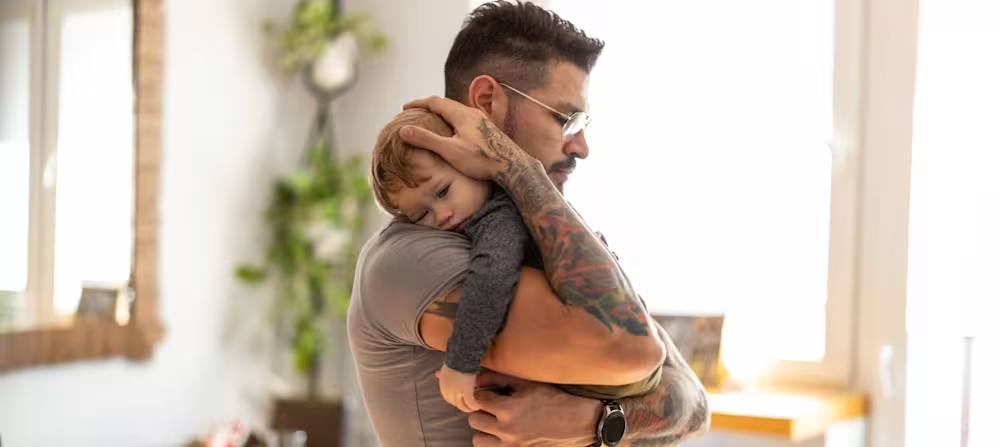Ask an expert with Dr. Erin Flynn-Evans
Updated Oct 16, 2025

This is the third part in our Spring 2022 "ask an expert" series. This time, you were able to direct your questions to Dr. Erin Flynn-Evans, Huckleberry scientific advisor and baby sleep expert. If you missed it, here's a round-up of questions answered by Erin. And don't forget to follow us on Instagram () for future insight into better sleep for the whole family.
Newborns and young babies
While older babies (4 months+) typically start to follow predictable patterns and schedules, newborns are a bit of an exception. Here are some common questions related to newborn sleep.
When do babies start to make associations for sleep/form sleep habits? I have a 5 week old.
The earlier you can start healthy sleep habits, the better. Sleep associations form over time, but tend to strongly take hold between 3 - 6 months. Try putting your baby down awake in their sleep space whenever you can (although don't drive yourself crazy — think of this as a nice to do, and when it doesn't work, that's OK!). I like to recommend that you try for at least one awake transition/crib nap a day right from the start. If you can do more than that, then that's great.
My 6 week old is sleeping 8 - 9 hours through the night with a dream feed at 9:30 PM. Is this OK?
This sounds like a great pattern. Unless your pediatrician suggested that you need to feed your baby more often overnight, enjoy that nice long stretch! This can be one of the benefits of .
Should the room be pitch black for all naps throughout the day for my 6 week old?
Your baby's room doesn't need to be pitch black for naps at 6 weeks old. As your baby's visual acuity improves (~4-5 months), then having a dark room for naps will help reduce the likelihood that your baby looks around the room and gets stimulated upon waking from a nap. It's OK to have naps on the go in a sub-optimal sleep environment before that time (and often necessary to get out of the house!).
With my 10 week old, how do I know when she is ready to transition from 5 naps to 4 naps?
I would let her tell you when she's ready. Once she starts needing more awake time and having difficulty falling asleep with typical wake windows, you can make the leap to 4 naps. Our can give you more information.
How do you stop a nurse-to-sleep association with a 3 month old?
There are many different ways to change sleep habits. One simple (though not necessarily easy) option is to exchange one sleep association for another. For example, consider rocking through some of those wakings if you're sure your baby isn't hungry. It may take 45 minutes for your baby to let you rock them to sleep on the first few nights, but it should get easier with time. Once your baby lets you rock to sleep, you may find that they start to skip the extra night waking. If not, then you can work on soothing your baby at crib-side as a next step.
My 3 month old is not sleeping well anymore. He doesn't want to take naps. Or he'll sleep for 2 seconds.
I would look at your baby's awake windows. I think that the hardest part of newborn sleep is that as soon as you figure something out, everything changes. Your baby might be ready for slightly longer awake windows, so I would begin to experiment with trying different awake times to see what's best for your baby at this point.
What is the recommended total awake time for 3.5 month old? He takes short naps.
At 3.5 months old, awake windows will typically range from 1 - 2 hours.
Sleep associations
Put simply, a sleep association is anything that helps your little one fall asleep. Sometimes it can become problematic if your baby needs or expects certain behaviors before heading to dreamland, so questions about this are common.
My 10 month old is waking the same time each night but settles again with a cuddle. Normal?
I like to say that this is only a problem if it's a problem for you. Believe it or not, I don't follow super strict sleep rules with my little ones. Sometimes your baby just needs a cuddle — and that's totally OK. I would only consider it an issue if your baby starts waking multiple times and/or if it feels like a problem to you.
I have an 8 month old. We safely cosleep and nurse-to-sleep. Should I transition to crib and train self soothing?
That depends! Is your pediatrician comfortable with your co-sleeping situation? Are you comfortable and happy with your situation? Is your baby rested and happy? If so, then I don't think you need to change anything. On the other hand, if the answer to any of the above is no, then you could consider to teach your baby new habits. Note that when I use the term sleep training, I mean teaching your baby to sleep without your help. Sleep training could be a traditional method, like checking in on your baby frequently, or it could be a gradual baby-led method. Whatever works for you is OK.
When should a baby be able to consistently put themselves to sleep?
Some babies will be able to do this in the first few months, while other babies will eat/be rocked to sleep and sleep through the night until they are over a year old. There isn't really a single time when a baby has to fall asleep independently. I would just say that if your baby needs help to fall asleep and wakes during the night expecting the same help, then it's a good idea to try to teach your baby to fall asleep independently.
Night wakings and bedtimes
Night wakings can leave you wondering what you're doing wrong, but most of the time you'll just need some simple nap and bedtime adjustments. SweetSpot can help you determine optimal nap times, and our sleep experts can help with custom schedules tailored just for you and your baby.
My sleep trained and night weaned 5 month old wakes for 30 - 90 minutes between 3:00 AM and 5:00 AM. Cries on/off. Why?!
It sounds like your baby is waking up for a reason and not because they don't know how to connect sleep cycles. Many will still need to eat overnight. I would first try to figure out whether the issue could be hunger. Waking between 3:00 AM and 5:00 AM is consistent with a hunger-related waking.
Try a at 10:00 - 11:00 PM to see if that eliminates the waking. Otherwise, check temperature and noise. Body temperature drops to its lowest point during the night. Adults can adjust blankets, but babies cannot, so sometimes babies will get cold during that 3:00 AM - 5:00 AM range.
How to help with false starts?
A false start is when it seems like your baby has gone down for the night, but then they wake up 20 - 60 minutes later. This is usually a nap or schedule issue. If your 3 - 4 month old baby is getting less than 4 hours of daytime sleep, then I would work on increasing naptime. If your baby is getting enough daytime sleep, then I would adjust bedtime. You may need to move bedtime later.
My 8 month old puts himself to sleep for naps and bedtime. Still wakes up twice at night to nurse. Hungry or just used to it?
When a baby falls asleep independently and only wakes 1 - 2 times a night to nurse, it usually does indicate hunger. That said, he may not need to eat overnight. If you want to try to see if he's ready to go down to one feeding, then begin to reduce the amount of time that you nurse him during his first waking. Work on maintaining distraction-free feedings and calorie-rich solids during the day while you taper down at night. He may begin to skip that first feeding after 5 - 7 nights. If he still seems to need it, then wait a little while and try again.
How should I handle the start of separation anxiety at bedtime? My 6 month old puts themselves to sleep independently.
If your baby starts to cry when you leave the room, it's always OK to come back for a quick reset. I usually recommend going back into the room, repeating some of the end of your bedtime routine and then trying the crib transition again. You can do this as many times as needed to offer your baby support and comfort, while also preserving independent sleep.
At what age can baby go into crib awake? Will they understand self soothing?
You can begin to put your baby down awake in the crib as soon as you get home from the hospital. It's all about offering a nice environment for your baby to learn to associate the crib with sleep.
Do a little routine by singing a sleep song and rocking, put your baby down awake, and see what happens. If your baby gets frustrated, then it's OK to give up and try again at the next nap or the next day. You just want to offer your baby exposure to the crib in order to allow them to begin to associate it with sleep.
What do I do if my 14 month old hates going into the cot when awake?
There are so many options for teaching your child how to go into the cot awake. You could do some sort of . If you aren't comfortable with that, then I would recommend giving your child some time in the cot with a different object of focus. For example, put your child in the cot and then make shadow puppets on the wall with a flashlight or play peek-a-boo on the side of the crib as a distraction. Don't force your child to fall asleep there; just get them used to going into the crib happy. Once you've broken the cycle of cot = frustration, then you can begin to soothe your child in the cot. This is a child-led approach, so it will take weeks to months. You just need to build a little every day.
What is a proper bedtime at 4 - 5 months? Baby seems most peaceful at 8:00/8:30. Too late?
There's absolutely nothing wrong with a bedtime at 8:00-8:30 PM. Babies have earlier or later circadian rhythms just like adults do. As long as you're able to let your baby sleep until between 6:30-7:30 AM, then an 8-8:30 PM bedtime is just fine.
Travel tips
You'll hear tons of advice from friends and family on this subject. One thing we can all agree on: It's best to go into a trip with a flexible mindset.
Any sleep tips for flying with a 2.5 year old and 9 month old and staying at a cottage?
Bring as many familiar elements of your sleep routine as you can. For example, bring a lovey, a book that you normally read, and a sleep sack or blanket (for the 2.5 year old).
Keep your routine as regular as you can.
Don't worry about naps on the go.
Black out the windows if you can.
My 5 month old baby slept for an entire 5 hour road trip. How should I adjust their bedtime?
There isn't a good answer for this because it depends on your baby's typical patterns and sleep history. My best advice is to do what you think makes sense. Watch your baby for sleepy signs and then begin your bedtime routine. You might not get it right, but that's OK. The situation is unusual, and sometimes you just have to make your best guess when you are traveling.
Naps
Ah, nap time. For many caregivers, it's the most important time of the day — so it's no surprise that so many of our users have questions about how to get the most out of these precious moments.
I'm trying to drop to one nap with my 16 month old, but the one nap only lasts an hour and baby gets overtired. What should I do?
It's normal for a child to have short naps during the early days of the transition to one nap. You'll probably need to vary between one and two naps for a few weeks until your little one settles into a sustainable one-nap pattern.
On days when your child takes a single nap that is too short, offer an early bedtime. However, try not to do an early bedtime more than two days in a row in order to avoid your child's bedtime shifting too early permanently.
My 11 month old twins are refusing their afternoon nap daily and then fall asleep when due to be wakened. Help!
I would check awake windows. Your twins might need a later second nap. If a later second nap isn't possible, then you might consider shortening their first nap so that they are ready for the second nap at the right time. Check out our for more tips.
When should the longest nap of the day be? My baby is 4.5 months old and takes four naps a day (three and a catnap).
The longest naps of the day normally happen during the first two. However, catnaps of 30 - 45 minutes are common at 4.5 months, so don't worry if your baby doesn't have a regular napping pattern right now.
My 16 month old has recurring split nights. OK to cap nap at 1.5 hrs? Two hours seems to be too much.
Yes, you can cap a nap to 1.5 hours at 16 months, but do it cautiously. You may actually find that it's easier for your little one to maintain a 2 hour nap with a shorter night. If your child is in bed for 12 hours at night, then I would shorten to 11 hours before shortening the nap.
General sleep tips
It can be easy to let frustration get the better of you when you have a baby. But remember: All babies are different, and just because your sister's best friend's cousin's son is a great sleeper, it doesn't mean yours will be — and it also doesn't mean you aren't doing as good a job. You are your baby's perfect caregiver. Pat yourself on the back and hang in there.
Do early "good sleepers" tend to stay "good sleepers" until adulthood?
I wish there was data to answer this question! The short answer is that we don't know. We need longitudinal studies that follow babies from birth until they are adults to know for sure.
Why do some babies learn to sleep better than others? Is it my fault?
Some babies are naturally easy sleepers, while others have a much harder time getting into a stable sleep pattern. I have studied sleep for 20 years, and sometimes I even have challenges managing my kids' sleep. Don't worry. I'd recommend that if nothing else, focus on the basics: make sure your baby has a regular bedtime, enough daytime napping, sufficient daytime calorie intake, and a consistent bed/nap routine. I'd also recommend trying to use the same phrases and comforts during night waking.
If you're still having difficulty, then consider seeking help. First, talk with your pediatrician for advice on what to do next. Your best course of action will depend on the type of problem that you're having.
Share article:
Note: The content on this site is for informational purposes only and should not replace medical advice from your doctor, pediatrician, or medical professional. If you have questions or concerns, you should contact a medical professional.
Share article:







